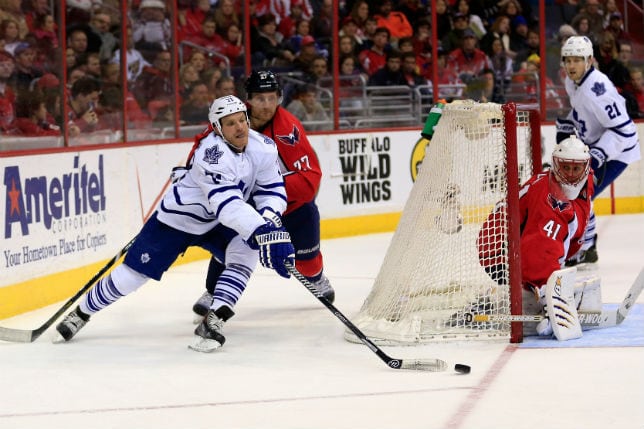
What do the Leafs do with David Clarkson?
Many thought the David Clarkson contract would come back to haunt the Maple Leafs in five years or so, but few thought it would be such an unmitigated disaster in Year 1. With that in mind, do the Leafs step up an buy him out?
 What do the Leafs do with David Clarkson?
What do the Leafs do with David Clarkson?When the Toronto Maple Leafs signed David Clarkson to a seven-year contract last summer, GM David Nonis responded to the question everyone in the hockey world was thinking. Was he concerned about devoting $5.25 million in cap space to a player most people thought would be a declining asset in the final years of the deal?
“I’m not worried about six or seven right now,” Nonis said. “I worried about one. And in Year 1 I think we’re going to have a very good player.”
Nobody, not Nonis nor Clarkson or anyone else, could have envisioned that Year 1 of the David Clarkson era in Toronto would be such an unmitigated disaster. I’m sure there have been worse fits between new players and teams in NHL history, but the Clarkson-Maple Leafs arrangement most certainly has to be in the top five. (And let's not start with the argument that he gets a bunch of faceoffs in the defensive zone. He has been a disaster any way you cut it.)
The Maple Leafs paid a premium to sign Clarkson because he was supposed to bring attributes which they were lacking – primarily a guy who both play in the top six and provide the kind of grit and physical play that could open up the ice for his teammates, as well as occasionally provide offense. What has turned out is that Clarkson has been a plodder on a very fast and explosive team, a player who appears to have lost his scoring touch and almost every time he displays that physical side, he ends up putting his team into trouble.
The funny thing is that Clarkson hasn’t changed that much as a player. In New Jersey he was getting power play time and significant minutes with Ilya Kovalchuk and it was reflected in his scoring totals. But what changed were expectations, brought on both by a contract that was almost impossible to fulfill and by a fan base that almost immediately nicknamed him Wendel Clarkson. (Of course Clarkson didn’t do himself any favors by not seriously playing down the Clark comparisons and by taking No. 71.)
So now the Leafs face a couple of monumental questions with Clarkson. The first is whether or not this season is an aberration or the first in a long tenure of unproductive play from Clarkson. If they deem it to be the latter, can they afford to have a guy like that around for another six years taking up $5.25 million in cap space? Even more importantly, can they afford to not have him around taking up cap space for the next 12 years?
The Leafs could partially get out from under this contract in one of two ways. First is they could find a trading partner – the Edmonton Oilers were willing to give him even more than the Leafs did – and take on a portion of his salary, keeping in mind that Clarkson has a limited no movement clause in his deal. The second way would be to buy him out after this season.
And if you’re a Leafs fan, you best sit down as we go through the buyout scenario. As we established, Clarkson’s contract is on the books for six more seasons at $5.25 million per. If the Leafs were to buy him out, the buyout period would last for double what’s left on the contract, which would take them to 2025-26. According to capgeek.com, they buyout cap hit would be structured the following way:
* $2.3 million in 2014-15
* $1.54 million in 2015-16
* $42,000 in ’16-17 and ’17-18
* $2.3 million in ’18-19
* $3.7 million in ’19-20
* $1.8 million from ’19-20 through ’25-26
And it would be an enormous amount in real dollars as well. Clarkson or his agent must have seen the buyout possibility coming because in every remaining season, the vast majority of his salary is paid in signing bonus. When a player is bought out, two-thirds of his salary is paid, but 100 percent of his signing bonus is paid. Of the $31.5 million Clarkson is owed over the next six seasons, $24.25 of it is to be paid in signing bonus money. That leaves just $7.25 million that is subject to a buyout, which means it would cost the Leafs a grand total of $29.1 million, plus 12 years or varying cap hits on the books, to buy Clarkson out.
None of the options seems terribly palatable. This was a contract that everyone knew was going to be a bad one in five or six years, but it turns out it has been a disaster right from the start. The good thing is that the cap hit is no more than $2.3 million in the next four seasons and by the time we get to the end of this century, the salary cap might be so high that those numbers will be a pittance.
One thing is certain, the Clarkson contract has put the Leafs in an untenable position, about five years sooner than they thought.


